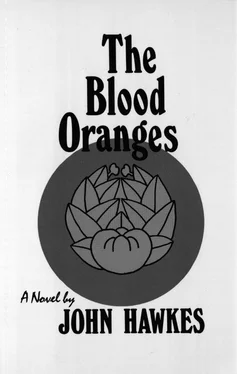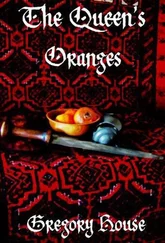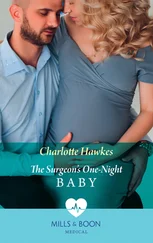First from our darkened room. First to abandon without a qualm our bed. First to find Hugh missing and not merely absent from Catherine’s side at the outset of the very day we planned to row the children to the chapel on our little nearby island. First to dart like a golden arrow into the clear and pointless energy of the high wind. That was Fiona, my all but clairvoyant wife, who now, I saw, was once more rushing out of sight through a rift in the wind-blown frieze of cypresses. But I was not far behind her, sleep-ridden and heavy and half dressed, and though I did not catch up with her until she stopped for a moment amidst the first chalky stones of that dead village.
“Don’t worry,” I shouted through cupped hands, “we’ll find him, wherever he is …”
For an instant longer I stood there squinting, rubbing my sleep-filled belly, fighting the wind, staring at the invisible spot where the trees and my wind-tossed wife had merged. Why wind? Where was it coming from? How could it blow with so much power and yet no direction? I swayed, I listened, I shaded my eyes, knowing that Catherine was indeed asleep and that Fiona’s haste was justified but futile and that the light itself had turned to wind or that the wind had somehow assumed the properties of the dawn light. We would make no joyous expedition to the island chapel, that much I knew. But if Catherine was still sleeping, at least her children were pathetically and ironically awake. Because with my first deliberate step in pursuit of Fiona, hands in pocket and breath hard won, I heard their piping cries high on the wind — or thought I did. And what were they trying to tell me, those senseless cries, if not the worst?
There was no reason to hurry, no time to lose. Behind me I left the twin villas now equally desolate, though one was occupied and one was not. Ahead of me lay the white sea and the narrow beach heaped up with the ominous splendor of all those uncountable spears of light and drowned in the silent velocity of the wind’s voice. Instinctively I turned left toward the village, I who was never a partisan to disaster now preparing in full consciousness to share with Fiona all the simple practicalities of pure disaster. My feet did not bleed on those sharp rocks, I did not run. But I knew what was coming and moved forward quickly enough to be of what help I could to Fiona.
“Wait,” I shouted, catching sight of her and waving, “you can’t do him any good alone …”
Did she hear me? Did she read my lips or take into account the meaning of my upraised hand? Was she standing there restrained in flight against that white wall out of need for me, out of concern for me, or only to collect her amazing energies and indulge herself in one moment of distraction for the sake of her fear, her plan, her determination? I approached, she waited, I saw the skirts of the tan coat beaten flat to the wall and the white gown beaten between her thighs. There in the driving light and silent wind at the entrance to the village, she might have given me the briefest smile of welcome, recognition, affection. But she did not.
“Fiona,” I said clearly and gently, “I’m not to blame …”
“I’m not blaming you, baby. How could I?”
And then she jerked away her perfect shoulder, jerked away the features of her face baked hard in seriousness, took back the fragment of attention she had given me, turned and ran off abruptly toward the center of the village. And now I ran. Yes, I kept pace with Fiona below roofs of fungus-green or rouge-red tiles and past rows of crooked and tightly shuttered windows. We smelled the fetid smell of the black canal. The wind glazed the chunky white façade of the squat church. At least there were no short and robust leather-suited figures to point to our bare feet and curious attire and to shout croak peonie or crespi fagag in the wake of our progress up that village street.
“Listen,” I said, “why don’t you wait down here? I think you should.”
Had she forgotten her many visits to that room above? Had she forgotten my own brief visit or two? Had she forfotten the rusty hinges, the knotholes, the formidable latch, the oddly polished surface of that rough wood? Was she oblivious to the significance of a closed door? But none of it meant anything to Fiona, who without listening or even hesitating merely used her shoulder against the sagging street-level wooden door and with one blow knocked it ajar.
I followed her into that brutal darkness. I was right behind her as she climbed. She stumbled, I heard her breath come back to me in short unhappy gasps. It was cold in the stair well, but we were safe at last from the wind.
“Hugh? I’m here, baby, I’m here …”
Yes, she was there. And I was there. And Hugh was hanging in the corner. Fiona, not I, yanked open that second and final low door of wide wooden planks. Fiona, not I, ran forward immediately into the filtered gray light of that small sloping barren room and initiated Hugh’s abortive rescue, with both arms embraced his naked waist and attempted to raise him up and relieve the tension of the rope on his neck. We arrived together, entered that little cold sloping room together, faced together the stark and unavoidable sight of Hugh’s nude body hanging amidst all his photographs in the corner nearest the inevitably shuttered window on the canal side of the room. Yes, Fiona and I were competitors for Hugh’s life from the first moment we intruded upon the scene both of his art, as he called it, and his death. And I too was active, except that I saw in a glance that the rope was much too thick and much too tight for Fiona’s courageous efforts, no matter how sensible they were on the surface, and understood at once what Fiona in all her intensity and devotion could not perceive— that our only hope was to cut him down immediately. So rather than join her in the corner, where now she was making soft agonized sounds of comfort, I turned instead to Hugh’s enormous homemade worktable and with a single heave cleared it of pans, traps, labyrinthine pieces of equipment, glass-stoppered bottles. Quickly I dragged it into position beneath the great rusted hook which, like a beckoning iron finger, held the end of the rope. And noting the open eyes, the smile on the open mouth, the sweat still fresh on his pitted brow, the glossy photograph clenched in his good hand, the white feet side by side and suspended only a few inches from the floor, quickly I stood on the table and freed the rope and helped Fiona lower him gently, swiftly, to the bare floor that was now Hugh’s crude temporary bier. We needed light, so in passing I smashed my elbow through the frail slats of those rotted shutters which Hugh in his love of darkness always kept closed. And when I withdrew my elbow and turned, still heavily in motion and using up no time, no time at all, I saw that that sudden long splintered shaft of light was falling directly on Hugh’s face and on Fiona’s swift hands already reaching for the rope at his throat.
Together we knelt at either shoulder, Fiona and I, together and in silence did all we could. But Fiona’s fingers, not mine, broke the spell of the noose, though I raised Hugh’s head so that Fiona was able to remove forever the hairy loop of that rope which was thicker than my two thumbs. And Fiona, not me, attempted without respite to blow life into that strangled man. Her face was low, her left hand was pillowing the back of Hugh’s head, her right hand was lightly braced against his chest, she was trying to breathe both for herself and Hugh. But here? Now? This confined space? These thick walls? This cell so bleak and at the same time so lurid? This broken light? This wreckage? This white body stretching as if from one end of the room to the other and welted with thin tendons that would never again relax? Was it possible? Was this the same Hugh who had danced one night for his children and taken his pictures and smiled at Fiona and carried Catherine into Illyria and thanked me solemnly for the song of the nightingale? Could even Hugh have made this miscalculation and closed all our doors? Fiona was not a woman to waste herself, or to expect senseless occurrences to make sense, or to blind herself to what she did not wish to know or punish herself for what she could not have. She was hardly a woman to display grief or to attempt to restore what had already been destroyed. But for once Fiona, still kneeling at what she knew full well was not even a final kiss, was behaving out of character, and I was glad. Until she spoke, which in the next instant she did, and even when she spoke, obviously Fiona was grieving, remembering, flying once more down the whole long road of eccentricity with Hugh. Before she pulled her mouth from his, before she sat back on her heels and looked at me, before she could notice what I was doing, quickly I plucked that cracked and shiny photograph from Hugh’s rigid grasp and thrust it from sight.
Читать дальше












